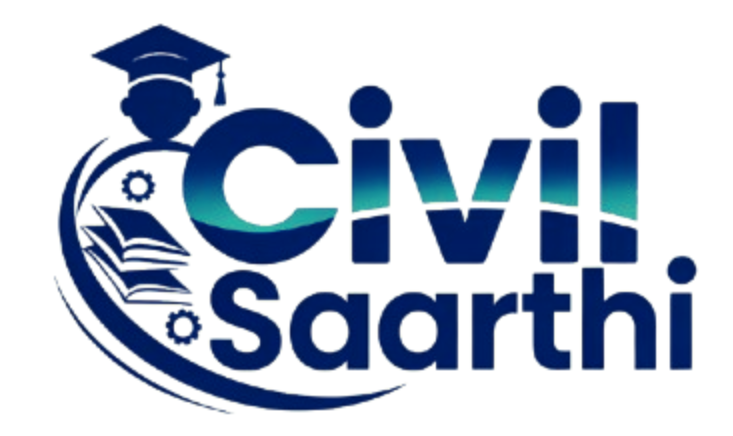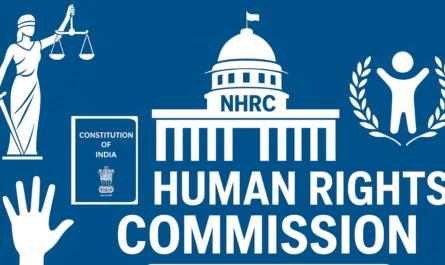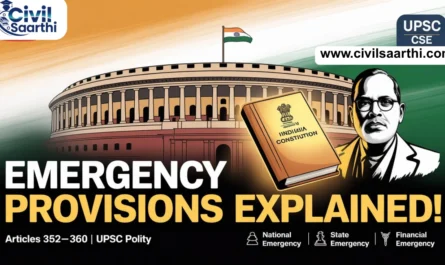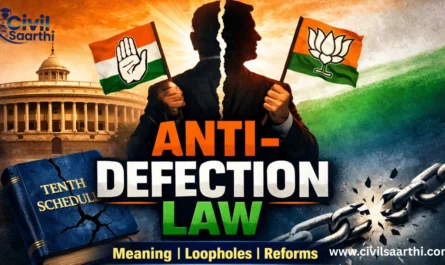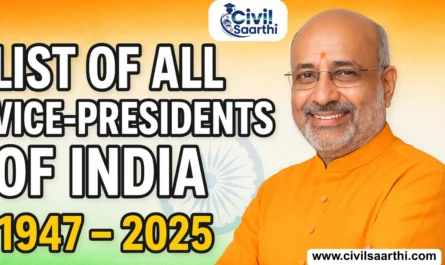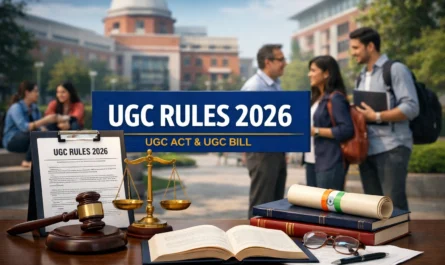The National Lok Adalat on 13 September 2025 will be organized across all states and union territories of India under the supervision of the National Legal Services Authority (NALSA). Lok Adalats provide a unique opportunity to resolve disputes speedily, amicably, and at minimal cost.
For ordinary citizens, it is a chance to clear pending traffic challans, utility bill disputes, and small claims with relief and concessions. For UPSC aspirants, it represents a vital example of Alternative Dispute Resolution (ADR) and India’s efforts to reduce judicial backlog.
What is Lok Adalat?
Lok Adalat, literally meaning “People’s Court,” is a forum where disputes are settled outside the regular judicial system through compromise. Established under the Legal Services Authorities Act, 1987, Lok Adalats ensure quick and affordable justice.
The awards passed in Lok Adalats are final, binding, and equivalent to a civil court decree. There is no further appeal, making the process efficient but also absolute. This makes them a vital instrument in achieving Article 39A of the Constitution, which mandates equal justice and free legal aid.
Schedule of National Lok Adalat – 13 September 2025
The September 2025 Lok Adalat will be held simultaneously across India. It will cover district courts, high courts, tribunals, and revenue courts.
| Date | Time | Coverage | Special Focus |
|---|---|---|---|
| 13 September 2025 | 10 AM – 4 PM | All States and UTs | Traffic challans, pending civil cases, MACT claims |
In Delhi, the Adalat will be held in all major courts: Patiala House, Saket, Rohini, Karkardooma, Dwarka, Tis Hazari, and Rouse Avenue. Citizens with pending challans and cases can approach their respective district courts for settlements.
Cases Taken Up in Lok Adalat
Lok Adalats only handle cases that are compoundable and capable of settlement. Below is a category-wise distribution:
| Category | Examples of Cases |
|---|---|
| Traffic challans | Overspeeding, signal jumping, no helmet/seatbelt |
| Civil disputes | Cheque bounce, loan recovery, money disputes |
| Motor accident claims | Compensation before MACT |
| Family matters | Custody, maintenance, alimony (not divorce) |
| Labour disputes | Wage claims, employee compensation |
| Consumer issues | Utility bills, service complaints |
| Compoundable offences | Minor criminal cases with compromise |
For the public, this means quick relief in everyday disputes. For UPSC, it demonstrates how ADR mechanisms reduce court pressure and improve citizen access to justice.
Comparison: Regular Court vs Lok Adalat
| Feature | Regular Court | Lok Adalat |
|---|---|---|
| Time taken | Several months/years | One-day settlement possible |
| Cost involved | Court fees + lawyer fees | No court fees; minimal expenses |
| Nature of judgment | Appeal possible | Binding and final, no appeal |
| Formality | Procedural and lengthy | Informal, compromise-based |
| Public Benefit | Stressful, delayed | Quick relief, citizen-friendly |
This comparison shows why Lok Adalats are widely popular among common citizens for resolving smaller disputes.
Benefits of National Lok Adalat
Lok Adalats offer significant advantages both for the public and the judicial system:
Speedy Justice – Cases are resolved in one sitting without adjournments.
Cost-Free – No court fees, and already paid fees are refunded.
Traffic Challan Relief – Up to 50% discount on fines in many states.
Binding Decisions – Awards are final like civil court decrees.
Judicial Backlog Reduction – Helps reduce over 4.5 crore pending cases in India.
Accessible Justice – Simple procedures make it easy for all, especially marginalized groups.
Stress-Free Settlement – Focuses on compromise rather than confrontation.
Constitutional and Legal Framework
Lok Adalats are not just informal setups but have solid legal backing:
| Provision | Relevance |
|---|---|
| Article 39A | Ensures equal justice and free legal aid |
| Legal Services Authorities Act, 1987 | Provides statutory recognition to Lok Adalats |
| NALSA | Apex authority that supervises Lok Adalats nationwide |
| Award Status | Equivalent to a civil court decree, final and binding |
This framework ensures that Lok Adalats combine constitutional values with legal enforceability, making them effective for governance and justice delivery.
Importance for Common Citizens
For the general public, Lok Adalats provide a hassle-free way to resolve disputes. Instead of waiting for years in courts, citizens can settle their traffic fines, loan issues, and family disputes in a single day. The process is simple, informal, and requires minimal paperwork.
This saves both time and money, and reduces the stress of prolonged litigation. Citizens particularly benefit during National Lok Adalats because of large-scale challan settlements and financial relief schemes.
Challenges of Lok Adalats
Despite their popularity, Lok Adalats face certain challenges:
Voluntary Nature – Both parties must agree to settle.
No Appeal – Awards are final, which may sometimes disadvantage weaker parties.
Awareness Issues – Many rural citizens are unaware of Lok Adalats.
Limited Scope – Serious criminal cases cannot be addressed.
Quality of Justice – Speed sometimes comes at the cost of fairness.
These challenges highlight the need for reforms to make Lok Adalats more inclusive and fair.
Way Forward
Several steps can make Lok Adalats more effective:
Awareness Campaigns to inform rural and urban citizens.
Pre-Screening of Cases to ensure only suitable matters are admitted.
Digital Lok Adalats for online settlement of challans and disputes.
Training for Mediators to balance fairness with compromise.
Monitoring Mechanisms to ensure weaker parties are not disadvantaged.
If implemented well, these measures can make Lok Adalats a pillar of India’s justice delivery system.
UPSC Practice Questions on National Lok Adalat (Prelims Level)
Q1. With reference to Lok Adalats in India, consider the following statements:
The award of a Lok Adalat is deemed to be a decree of a civil court and is binding on the parties.
There is no provision for appeal against the award of Lok Adalat.
Lok Adalats can adjudicate both compoundable and non-compoundable criminal cases.
Which of the above statements is/are correct?
A. 1 only
B. 1 and 2 only
C. 2 and 3 only
D. 1, 2 and 3
Answer: B
Explanation: Awards of Lok Adalats are binding and final, equivalent to a civil court decree. No appeal lies against them. However, they cannot take up non-compoundable criminal cases.
Q2. Consider the following provisions:
Article 39A of the Constitution of India
Legal Services Authorities Act, 1987
Arbitration and Conciliation Act, 1996
Which of the above provides a constitutional or statutory basis for the functioning of Lok Adalats?
A. 1 and 2 only
B. 2 and 3 only
C. 1 and 3 only
D. 1, 2 and 3
Answer: A
Explanation: Lok Adalats are established under the Legal Services Authorities Act, 1987 in line with the constitutional mandate of Article 39A. The Arbitration and Conciliation Act, 1996 is related to arbitration, not Lok Adalats.
Q3. Which of the following correctly differentiates between Permanent Lok Adalat (PLA) and National Lok Adalat?
| Feature | Permanent Lok Adalat | National Lok Adalat |
|---|---|---|
| Jurisdiction | Pre-litigation disputes on public utility services | Cases pending in courts + pre-litigation disputes |
| Frequency | Continuous, institutional body | Organized on specific dates nationwide |
| Authority | Has limited adjudicatory power if settlement fails | Functions purely on compromise/settlement |
Which of the above comparisons is correct?
A. 1 and 2 only
B. 2 and 3 only
C. 1 and 3 only
D. 1, 2 and 3
Answer: D
Explanation: PLAs deal with public utility service disputes (like transport, postal, electricity) and can decide cases if compromise fails. National Lok Adalats are periodic, settlement-based forums.
Q4. Which of the following types of disputes can be taken up by Lok Adalats?
Motor accident compensation claims
Family disputes relating to custody and maintenance
Labour disputes regarding wages and compensation
Divorce petitions filed under the Hindu Marriage Act
A. 1 and 2 only
B. 1, 2 and 3 only
C. 2, 3 and 4 only
D. 1, 2, 3 and 4
Answer: B
Explanation: Lok Adalats can deal with civil disputes, family disputes (except divorce), motor accident claims, and labour disputes. Divorce cases are excluded as they are not compoundable.
Q5. In the context of judicial reforms in India, the National Lok Adalat held on 13 September 2025 primarily aims to address which of the following challenges?
Increasing pendency of cases in regular courts
Providing speedy and affordable access to justice
Settlement of serious criminal offences
Reducing burden on higher judiciary only
A. 1 and 2 only
B. 1, 2 and 4 only
C. 2 and 3 only
D. 1, 2, 3 and 4
Answer: A
Explanation: National Lok Adalat reduces pendency and provides affordable justice. It does not handle serious criminal cases, nor is it restricted to higher judiciary alone.
FAQs on National Lok Adalat 2025
Q1: What is National Lok Adalat?
It is a nationwide initiative to settle disputes in one day through compromise, organized by NALSA under the Legal Services Authorities Act, 1987.
Q2: Can I get a discount on traffic challans?
Yes, during National Lok Adalat, several states provide up to 50% discount on pending challans.
Q3: Are Lok Adalat decisions binding?
Yes, the awards are final and equivalent to a civil court decree. No appeal is allowed.
Q4: What kind of cases are not taken up?
Serious criminal offences, divorce petitions, and non-compoundable cases are excluded.
Q5: How can I check if my case is listed?
You can check through your district court website, visit the legal services authority office, or approach your lawyer.
